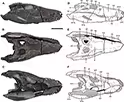Predicting the Next Ice Age: What Science Says About the Timeline
When Will the Next Ice Age Happen? Scientific Predictions
Reading time: 1 minute, Discovery Chepe Id-591-ECO
Published on 03-04-2025

The last great ice age, known as the Pleistocene glaciation, peaked about 20,000 years ago.
The question of when Earth will experience its next ice age is the subject of intense scientific study. Glacial cycles, driven by variations in Earth's orbit (Milankovitch events), have shaped our planet's climate for millions of years.
Glacial Cycles and Predictions
Scientists use geological records and ice cores to reconstruct past climates and predict future patterns. These studies reveal that ice ages occur in cycles, with glacial and interglacial periods. Currently, we are in an interglacial period called the Holocene.
Influencing Factors
Several factors influence the arrival of a new ice age:

Future Ice Age: Latest Scientific Estimates and Forecasts
Orbital Variations: Changes in Earth's orbit affect the amount of solar radiation that reaches our planet.
Greenhouse Gas Concentrations: Increased CO2 and other gases could delay or even prevent the next ice age.
Solar Activity: Periods of low solar activity, such as the Maunder Minimum, may contribute to cooling.
When is the next ice age expected?
According to scientific studies, the next ice age could begin in about 10,000 years. However, current climate change could alter this timeline. Increased greenhouse gases could significantly delay the arrival of the next ice age.
Impact and Preparation
A new ice age would have a profound impact on the planet:
Changes in Sea Level: Water would freeze at the poles, lowering sea levels.
Migration of Species: Animals and plants would adapt or migrate to new areas.
Challenges for Humanity: Agriculture and infrastructure would be affected.
Science continues to investigate glacial cycles and the impact of climate change. Although the next ice age seems far away, it is crucial to understand these processes to prepare for the future.
See Also
Discovery Chepe
Most read...














